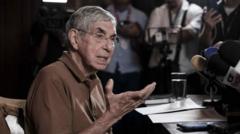Oscar Arias, the 84-year-old former president of Costa Rica and a Nobel Peace Prize recipient, has announced that his US visa has been revoked, a decision he attributes to his recent public criticism of former President Donald Trump. Arias made headlines after likening Trump’s behavior to that of a Roman emperor, implying authoritarian tendencies in his governance.
Weeks after making these remarks, Arias received a terse email from US authorities, which failed to provide him with a reason for the cancellation. While he suspects that political dynamics, particularly his past establishment of diplomatic relations with China during his presidency from 2006 to 2010, may be at play, he clarified that he could only speculate without concrete evidence.
At a press conference in San José, Arias emphasized that he had "no idea" why his visa was revoked and suggested that the decision likely came from the US State Department, rather than directly from Trump. He also pointed to his significant decision in 2007 to sever ties with Taiwan in favor of recognizing China, a move that has stirred geopolitical tensions since the Trump administration actively opposed Chinese influence in Central America.
Arias's criticisms extend beyond his own situation; he has also condemned the current Costa Rican administration led by Rodrigo Chaves, who has received positive reinforcement from the US for excluding Chinese companies from participating in Costa Rica's 5G development. This dynamic highlights the lingering complexities in Central America’s relationship with the US, especially for smaller nations navigating pressures from larger powers.
Importantly, Arias is not alone in facing visa issues; three members of Costa Rica's national assembly who have opposed Chaves’s policies regarding Chinese investments have also experienced similar cancellations. As relations between Central American countries and the US continue to evolve, Arias’s case serves as a poignant reminder of the diplomatic challenges that arise in a globalized political landscape.



















